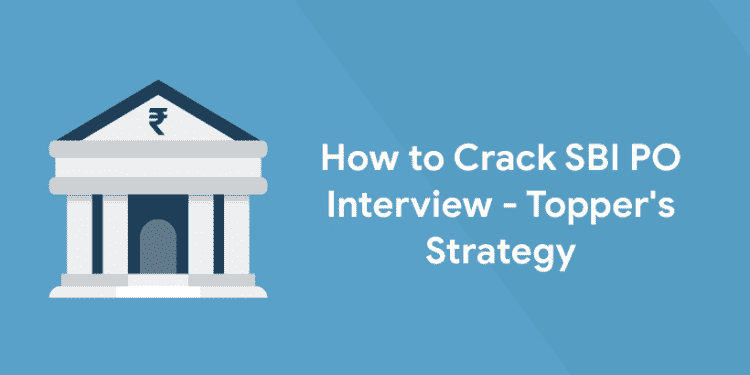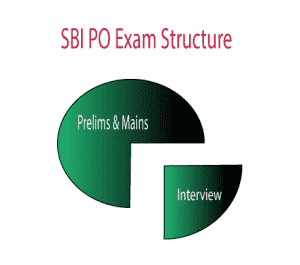Table of Contents
Earning crores of rupees is not a simple matter. It requires a lot of hard work and a responsible lifestyle for that. Dealing with crores of rupees also demands the same traits. SBI Probationary Officer (PO) is one of that kind which imposes that much responsibility over you. It’s not that easy to get into that position since the examination is spread over three layers as prelims, mains and interview. All of the institutes will be discussing the prelims and main strategy aspirants need to have for cracking the examination. None of the coaching institutes will discuss regarding the interview which is the major key player in the selection process. Through this article we discuss how to prepare for the SBI PO interview in light of the toppers experience.
Get Study Materials for SBI PO Exam! Click Here!
Understanding Why they conduct Interviews?
The first phase of preparation for the SBI PO interview is understanding why they are conducting the interview. There are bank exams which do not have an interview in its selection process. Why does the Probationary Officer selection require an interview qualification? Have you ever thought of that? Well that is because:
1.Probationary Officer is the face of the bank before the people.
There are jobs which require your knowledge and intellectual talent like scientists, research scholars etc. There are jobs which require interactive skills like business sales executive, motivational speaker, counsellor etc. SBI PO is one that requires both the skills. They need your intellectual and knowledge skills and at the same time the interactive skills because the probationary officer will be acting as the face of their bank to the people. Your intelligence and knowledge have been already evaluated through the prelims and mains examination your emotional and interactive kills are yet to be evaluated. That’s why they are conducting the examination.
2.You are the bridge between employees and employers.
The probationary officer acts as the bridge between the employees in a bank and the superior authority of the bank. Their administrative decision should be implemented without causing any trouble to the employees. The employee’s grievances should be addressed and should be eradicated. And those which are not at all eliminated should be reported to the superior authority. PO should act as a local administrator of the bank addressing all the problems. Your problem-solving skills will be evaluated and your administrative skills will be evaluated in an interview.
3. You are the burden holder.
Sounds like a bit of exploitation, but it’s true! When more power comes, more responsibility arises. Remember the date 8th November 2016 when the demonetization hit the country the bank officers were the ones who relentlessly tried to uplift the economy to the back level. In a bank the probationary officers were the ones who suffered all the burden to carry out the mission. A lot of burden will be imposed on the shoulder of the PO in order to tackle a struggling Situation. So, the recruiters will definitely evaluate whether your shoulders are wide enough to uplift the burden by analyzing your emotional quotient.
4. Everyone looks forward to a decision from you.
The spontaneous decision making is another requirement for the Probationary officers. Every employee and customer will look forward to a decision in matters imposing uncertainty among them. They will look forward to a decision from the probationary officers since they are in the position to make a decision. So, your decision-making power will be evaluated in an interview.
Understanding the structure of an SBI PO Interview
1: What does the acronym "ATM" stand for in banking?
The second phase of the preparation of the SBI PO interview is to understand the structure of the SBI PO interview. The SBI PO interview is usually conducted in two phases in order to evaluate the above specified requisites. The two phases are:
Group Discussion (GD):
Group Discussion is an often practice of evaluation done by most of the interviewers today. It is usually conducted by grouping students and giving them a common subject to have a discussion regarding the subject. Here the language skills, the interactive skills, the presentation skills, the convincing skills, the rational thinking skills and skills of handling arguments will be evaluated. They won’t be giving a hard subject in order to evaluate your knowledge grade but of course your knowledge will be evaluated. More than your knowledge the above skills will be evaluated in a group discussion.
The Do’s and Don’ts in a GD
- Try to start the discussion. They will always notice who initiates the discussion when everyone is sitting numb. But don’t be baffled with others for getting a start.
- GD is not always about speaking but also about listening. A good listener can become a good speaker. So, listen to your colleague’s ideas.
- Don’t eat everyone’s time. Make your point clear and short. Try to give opportunity to others to share their ideas. The one who tries to dominate over the GD will be ignored by the recruiters.
- Don’t go for heated arguments. GD is not a debate. If you stick on to your point by suppressing your colleague’s ideas you will be easily get eliminated. It shows your emotional quotient is drastically low.
- Try to initiate a conclusion by converging everyone’s idea. It shows your coordination skills and leadership skills.
Personal Interview:
The personal interview is the final stage in an interview process. This is a one to one stage. You’re sitting alone in front of the interviewer. The interviewers may consist of a panel or a group of two or three peoples. Probably the panel consists of some subject experts and a psychologist. The subject expert evaluates the correctness of your answers regarding the subject and the psychologists analyse your gestures to have a clear picture about your personality. The interview is not often done to evaluate your knowledge, they have already evaluated it through the exam itself but to understand your capability to handle the situation you don’t know. So, they try to ask questions that you don’t know. How you handle those situations without perplexity will determine whether you are able to handle burdens and whether you are capable to perform responsibility.
Do’s and Don’ts in an interview.
- Do carry a resume with you. Resume should be newly updated with zero errors in it. If you happen to have an error in the resume it means you are inefficient and irresponsible. Its good to complete the resume in a single sheet.
- If you are asked to self-introduce yourself don’t go by the usual cliché “My name is ……”. it itself shows that you’re numb. Because your name and everything about you are already in the resume and they might have gone through it. You don’t need to repeat that. Try to say something not there in a creative way like your aspirations, dreams, your strength etc.
- Don’t say any cook up story or a lie to impress. They can easily find it like an investigating officer. Always try to be genuine. It increases your chance of getting in.
- It’s ok to say ‘I don’t know’. because it shows your courage to accept the things that you don’t know. But it’s not advisable to say you don’t know everything. Because a 1st standard student can do the same.
- Try to be emotionally stable. They may try to provoke you by asking illogical questions or by denying a right answer of yours to evaluate how you handle the provocation and stress. If you get heated up you will be fired.
- Go with a good smile and whatever happens return with a good smile. It increases your self confidence and it presents you in a nice way.
Conclusion.
It’s not at all possible to study what an interviewer is going to ask. So, don’t waste your time by studying books which talk about the questions that will be raised in SBI PO interview. Interview is all about how you behave. Go through the above areas, revamp yourself and make your face capable of facing everything with confidence, you will be able to pass the SBI PO interview easily. Keep studying, keep winning.












